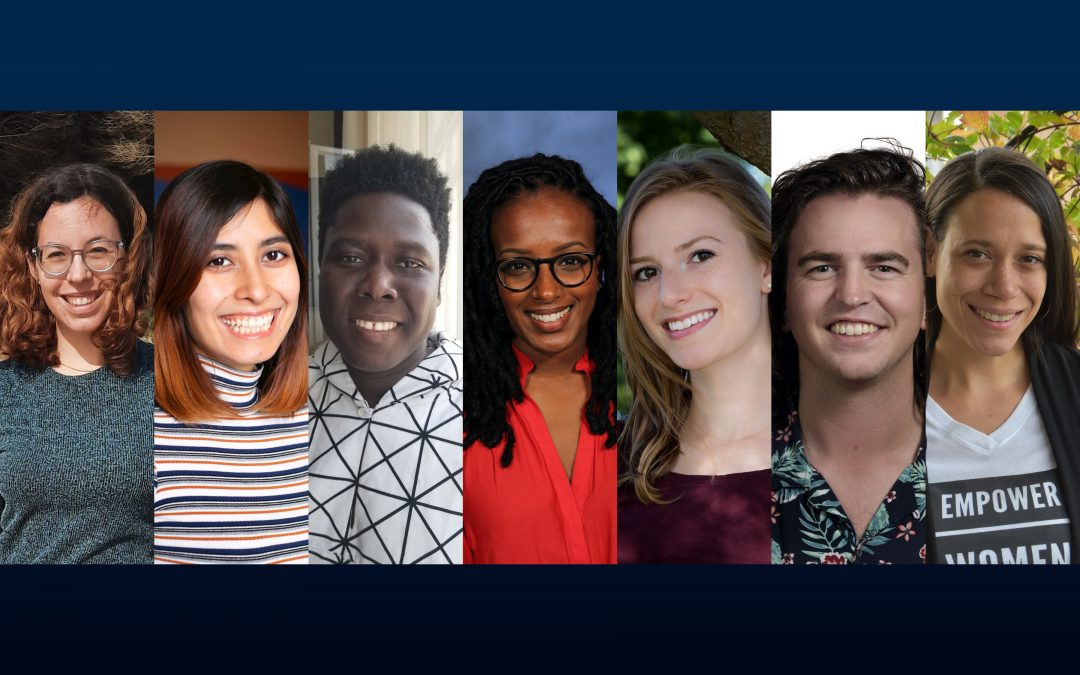The Rackham Program in Public Scholarship is pleased to announce its 2021 Public Scholarship Grant awards for graduate students. This year’s Public Scholarship Grants will provide more than $47,000 in funding to support six mutually beneficial projects co-created by Rackham students in partnership with community organizations.
Each project brings graduate student scholarly interests and skills to bear in addressing a community identified need, and each collaboration will deliver a tangible public good. This year’s funded projects reach a wide range of communities, both close to campus and across the globe. The projects support empowerment for LGBTQ+ youth in Michigan, help to elevate the voices of independent Eritrean journalists, and advance knowledge sharing in Gambian social studies classrooms, just to name a few.
“These projects show how it is possible to make exciting connections between research, learning, and the public good,” says Arthur Verhoogt, the Rackham associate dean for academic programs and initiatives in humanities and the arts, and a professor of papyrology and Greek in the U-M Department of Classical Studies. “This fits well with Rackham’s vision for graduate education.”
A review committee selected the awardees from an extremely competitive pool of proposals.
“The diversity and strength of the application pool and of the six funded projects demonstrates the scope, creativity, and quality of public engagement work graduate students are doing at U-M,” says Rackham Program Lead Joe Cialdella.
By choosing to make public engagement a part of their graduate education, this year’s cohort will be able to make distinct contributions to the community needs they serve, the practice of publicly engaged scholarship, and their research.
The Rackham Program in Public Scholarship has been supporting public scholarship on campus since 1998, when it began as the former Arts of Citizenship Program. Its mission is to support collaborative scholarly and creative endeavors that engage communities and co-create public goods while enhancing students’ professional development around public engagement and community-based learning.
This year’s grant recipients and their projects are:
Kristen Connor and Lamin Manneh
Ph.D. Candidates, Anthropology and History, History
“The Gambian Urban History Sourcebook Project”
In partnership with A Better Chance Learning Centre and the National Records Service of The Gambia, Kristen Connor and Lamin Manneh will create the first free, open-source primary sourcebook on Gambian Urban History for use in high school classrooms. The sourcebook will include grade-appropriate and curriculum-aligned lesson plans, activities, and discussion questions to accompany selected historical documents, designed in consultation with a focus group of social studies teachers in The Gambia.
Daniel Delmonaco
Ph.D. Student, School of Information
“Collaborative Design of Sex Education Zines”
In partnership with the Michigan Organization on Adolescent Sexual Health (MOASH), Daniel Delmonaco will work to empower Michigan teenagers to identify gaps in their sex education experiences and to develop accessible, trustworthy, LGBTQ+ inclusive resources to help fill those gaps for peers. Fifteen participants will create zines (short-form booklets) with mentorship from sex educators and an established comic book artist to be circulated to other Michigan youth.
Timnet Gedar
Ph.D. Candidate, History
“Imprisoned Words: De-censoring Eritrean Newspapers Through the Archive”
In partnership with PEN Eritrea in Exile, Timnet Gedar will create a digital archive or banned Eritrean newspapers published between 1997 and 2001. The Eritrean government began a violent crackdown on the independent press in 2001, jailing journalists, censoring the press, and limiting access to archived copies of private newspapers. This project aims to help preserve and revive Eritrean public discourse by recovering uncensored records and making them accessible to Eritreans across the world.
Etienne Herrick
Ph.D. Student, School for Environment and Sustainability
“A Collaborative Approach to Managing Crop Diversity for Agricultural Sustainability in the Great Lakes Region”
In partnership with Michigan Agriculture Advancement, Etienne Herrick will work with farmers across the Great Lakes region to co-produce and circulate knowledge about how to optimize cover crop management to increase sustainability, reduce reliance on harmful synthetic inputs, and enhance farm resilience. Citizen science data collection and online discussion will include farmers in the research process and generate actionable recommendations for the unique conditions of actual farms.
Irene Routté
Ph.D. Student, Social Work and Anthropology
“Grand Rapids Congolese Refugee Youth Council and Leadership Program”
In partnership with Michigan Banyamulenge Community (MBC), a refugee-run organization in Grand Rapids, Irene Routté will help develop and launch a community-driven youth council and leadership development program for Congolese refugee youths. This project will help MBC extend its organizational capacity to serve the roughly 8,000 Congolese refugees in the Grand Rapids area and create a space of support and empowerment for Congolese and other refugee youth.
Jennifer Sierra
Ph.D. Student, Anthropology
“‘Axenon Ikanwe,’ a Shipibo-Konibo Community Radio Initiative for Language Revitalization and Community Healing”
In partnership with the hosts of the Axenon Ikanwe (Let’s learn together) community radio show in Peru, Jennifer Sierra will create a YouTube channel and website that will help the three-year-old grassroots program work to revitalize and revalorize the Shipibo-Konibo language and culture among Shipibo indigenous communities in the Peruvian Amazon. By documenting traditional practices and by showcasing diverse new forms of creative expression, the project aims to foster pride, belonging, and connectedness across 150 rural and urban Shipibo communities, among the hardest hit in the world by the COVID-19 pandemic.

